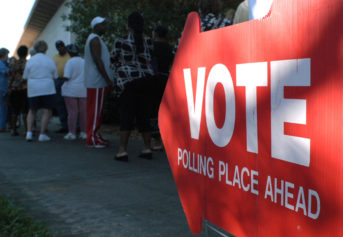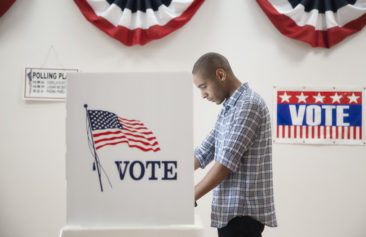A federal court stopped Texas from implementing a new voter ID law that the court said is “the most stringent in the country,” providing a major victory for the activists and groups who have been trying to use the courts to fight voting restrictions that have been passed around the country.
The ruling by the three-judge panel in the United States District Court for the District of Columbia said Texas had failed to prove that the mandate would not disproportionately suppress turnout among minority voters.
“The State of Texas enacted a voter ID law that — at least to our knowledge — is the most stringent in the country,” the court wrote. “That law will almost certainly have retrogressive effect: it imposes strict, unforgiving burdens on the poor, and racial minorities in Texas are disproportionately likely to live in poverty.”
The primary issue that bothered the courts appeared to be the fact that citizens without licenses might have to pay $22 for the documents needed to apply for a state ID, and in some counties would have to travel as many as 250 miles round trip to get the ID.
During the trial, a lawyer for the state argued that proving the new law wouldn’t reduce minority voting power was an “impossible burden.” But in Thursday’s ruling, Judge David S. Tatel, one of the three judges on the panel, wrote that if that was indeed the case, the lawyer had his client to blame.
The judge said the Legislature had ignored warnings that the bill as written “would disenfranchise minorities and the poor,” and defeated several proposed amendments that would “could have made this a far closer case.”
Though opponents of the voting restrictions that have been passed in more than a dozen states will want to see whether this decision can be applied in other states, many of the recent court decisions in places like Indiana, Georgia and Arizona may have narrow interpretations that may not be applicable elsewhere.
Attorney General Eric H. Holder Jr., who has been an outspoken critic of the spate of newly imposed restrictions on voting, praised the ruling.
“The court’s decision today and the decision earlier this week on the Texas redistricting plans not only reaffirm — but help protect — the vital role the Voting Rights Act plays in our society to ensure that every American has the right to vote and to have that vote counted,” he said in a statement. “The Justice Department’s efforts to uphold and enforce voting rights will remain aggressive and evenhanded. When a jurisdiction meets its burden of proving that a proposed voting change would not have a racially discriminatory purpose or effect, the department will not oppose that change; when a jurisdiction fails to meet that burden, we will object.”
But Texas Attorney General Greg Abbott called the decision “wrong on the law” and said that Texas would keep fighting.
“The state will appeal this decision to the U.S. Supreme Court, where we are confident we will prevail,” said Abbott, who has also vowed to appeal the redistricting case.


